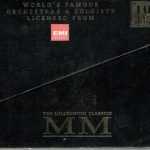
Composer: Antonín Dvořák, Gustav Mahler, Maurice Ravel
Performer: Magdalena Kožená
Orchestra: Berliner Philharmoniker
Conductor: Sir Simon Rattle
Format: FLAC (tracks)
Label: Deutsche Grammophon
Catalogue: 4790065
Release: 2012
Size: 223 MB
Recovery: +3%
Scan: yes
Dvořák: Biblical Songs, Op. 99
01. 1. Oblak a mrákota jest vůkol něho
02. 2. Skrýše má a paveza má Ty jsi
03. 3. Slyš o Bože! Slyš modlitbu mou
04. 4. Hospodin jest můj pastýř
05. 5. Bože! Bože! Píseň novou
06. 6. Slyš, o Bože, volání mé
07. 7. Při řekách babylonských (Psalm 136)
08. 8. Popatřiž na mne a smiluj se nade mnou
09. 9. Pozdvihuji očí svých k horám
10. 10. Zpívejte Hospodinu píseň novou
Ravel: Shéhérazade
11. 1. Asie
12. 2. La flûte enchantée
13. 3. L’indifférent
Mahler: Fünf Lieder nach Gedichten von Friedrich Rückert
14. Liebst du um Schönheit
15. Blicke mir nicht in die Lieder
16. Um Mitternacht
17. Ich atmet’ einen linden Duft
18. Ich bin der Welt abhanden gekommen
Magdalena Kožená’s silken mezzo delivers definitive interpretations of this luscious and enchanting orchestral-song repertoire.
Magdalena Kožená, Sir Simon Rattle, and the Berliner Philharmoniker seduce in Ravel’s Shéhérazade, stir and awe in Dvorák’s austere Biblische Lieder, and render to the fullest the bittersweet potency of Mahler’s intricately orchestrated Rückert Lieder.
Recorded live at the Berlin Philharmonie, these performances excite with the intense musical understanding shared by this husband-and-wife musical dream-team.
This is the first in a new series of recording projects reviving the legendary partnership between DG and the Berliner Philharmoniker.
This album of three very different song cycles comes from a live 2012 recording Czech mezzo-soprano Magdalena Kozená made with the Berlin Philharmonic, led by Simon Rattle. It’s a hugely successful recording by one the most multifaceted, expressive, and distinctive mezzo-sopranos of her time. From the first notes of Dvorák’s Biblical Songs, Kozená warm, limpid voice and lyrical phrasing envelop the listener. The Biblical Songs are relatively reserved, understated settings of selections from Psalms that highlight the deeply personal, passionate interior focus the singer is capable of evoking. The songs may not be overtly showy, but they put Kozená’s dark amber tone and the velvety seamlessness of her delivery on full display. Ravel’s Shéhérazade and Mahler’s Rückert Lieder on the other hand give Kozená the opportunity to cut loose and soar ecstatically over the orchestra. In the Ravel she sings with an appropriately Gallic transparency. She brings a sound to the Mahler that is both solid and refined and there are many moments, such as at the ending of “Um Mitternacht” where her voice has a shimmering radiance. The three cycles are stylistically diverse but heartfelt emotion is at the root of each of them, and Kozená gives voice to those passions with nuanced tonal coloring and musically varied delivery. Her singing is matched by the lustrous playing of the Berlin Philharmonic. Rattle is a sympathetic collaborator and is acutely sensitive to the give and take between singer and orchestra, particularly in the sensuous rhythmic fluidity and timbral translucence of the Ravel. Deutsche Grammophon’s sound is so clean, present, and well-balanced that it could easily be mistaken for a studio recording.



